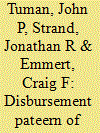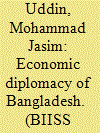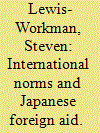|
|
|
Sort Order |
|
|
|
Items / Page
|
|
|
|
|
|
|
| Srl | Item |
| 1 |
ID:
088882


|
|
|
|
|
| Publication |
2009.
|
| Summary/Abstract |
Three perspectives on the determinants of Japan's official development assistance (ODA) program are often represented as distinct, valid explanations of the aid program. Yet few studies have attempted to simultaneously test the hypotheses generated from all three perspectives in a global study of Japanese aid flows. This study seeks to improve the understanding of the Japanese ODA program by addressing some of the gaps in the existing literature. Providing a comprehensive analysis, the article investigates the effects of different political and economic variables on Japanese aid disbursement in eighty-six countries in Africa, Asia, Latin America, and the Middle East from 1979 to 2002. The findings of the study make several contributions to the literature. First, the results provide strong support for the claim that humanitarian concerns, as measured by poverty and human rights conditions in recipient countries, are important determinants of aid allocation. Second, although much of the previous literature has hypothesized that Japan's aid program seeks to promote Japan's economic interests, little empirical support for this view is found in the present study. Likewise, the disbursement pattern of ODA was associated with only a limited number of US security interests; US economic interests are shown to have no effect on ODA.
|
|
|
|
|
|
|
|
|
|
|
|
|
|
|
|
| 2 |
ID:
143631


|
|
|
|
|
| Summary/Abstract |
The paper examines the domestic politics surrounding South Korea's foreign aid policy. It delineates the institutional characteristics and strategic interests of key government and non-government stakeholders, and suggests an analytical framework to comprehend the country's aid policy regime. It suggests that two competing policy discourses exist – one emphasising ‘intellectual leadership’ and the other ‘ethical leadership’ as the key principle of aid policy. In practice, the country's political leadership promulgates a complex amalgam of these discourses in alignment with their own political imperatives and interests. The paper discusses ‘Global Saemaul Undong’ as such an example under the incumbent Park Geun-Hye administration.
|
|
|
|
|
|
|
|
|
|
|
|
|
|
|
|
| 3 |
ID:
151050


|
|
|
|
|
| Summary/Abstract |
Studies on economic diplomacy of Bangladesh examine foreign policy and external economic aspects of the country. Such studies have not yet focused on Bangladesh’s Official Development Assistance (ODA) centric economic diplomacy. Instead of assessing how much and whether ODA is required for Bangladesh’s development priorities, this paper examines the major issues of ODA-centric economic diplomacy of the country and how they are to be dealt with. The paper thus limits its scopes – what is on offer or what ODA is on supply keeping aside Bangladesh’s development needs. Rather than providing concrete policy measures for various key ministries and divisions, this paper provides some propositions that could be taken by the Government of Bangladesh (GoB) into consideration. Realising dynamism of global assistance, assessing conditionalities of ODA, lessening gap between commitment of aid and its disbursement, emphasising more on Aid for Trade (AfT) and mobilising climate financing are important issues for ODA-centric economic diplomacy of Bangladesh. No sources at multiple levels which are not tied with tough conditions should in general be left aside by the country. Priority needs to be given to countries or organisations which have already provided soft loans or grants, are still willing to do so as well as those which have emerged as new sources of assistance. The GoB requires exercising effective economic diplomacy to respond to these issues.
|
|
|
|
|
|
|
|
|
|
|
|
|
|
|
|
| 4 |
ID:
158054


|
|
|
|
|
| Summary/Abstract |
Do norms influence Japan's foreign aid? Japan's aid policy statements have increasingly emphasized humanitarian and democratic values, but few studies demonstrate a shift in Japan's aid policy that reflects this changing discourse. In this study, I seek to determine if Japan's foreign aid commitments increasingly reflect normative factors or continue to be allocated based on commercial or security considerations. The results indicate that humanitarian and democratic values had very little influence on Japan's foreign aid commitments over the entire analysis period. Contrary to conventional wisdom, commercial benefits had little importance before 1992 and are a significant factor only during the 1992–2001 period. Security considerations are strong predictors during the Cold War period and are even more significant after 2001 when Japan's foreign aid became increasingly aligned with US security policies. Further, Japan has not substantially increased the share of its aid to “soft” sectors or disaster response, but it has adopted the international norm of debt relief for highly indebted poor countries and shifted a substantial amount of foreign aid from infrastructure lending to debt forgiveness.
|
|
|
|
|
|
|
|
|
|
|
|
|
|
|
|
| 5 |
ID:
192075


|
|
|
|
|
| Summary/Abstract |
Japan formulated its first infrastructure export strategy in 2010. However, the outputs and effects of that strategy and its successive revisions over the preceding decade have not yet been extensively reviewed. Although infrastructure came to the fore of the international agenda over the past decade, existing research has mostly discussed individual infrastructure projects and accompanying signalling, sloganeering, and strategic communications in the geopolitical and geo-economic context. This paper therefore aims to make an empirical and interpretive contribution to existing scholarship by comprehensively reviewing Japan’s infrastructure exports in 2010–19 and elucidating further its oft-disregarded commercial and developmental aspects. To do so, this article focuses on Official Development Assistance (ODA) loan projects, which count among the largest items of Japan’s infrastructure exports. We introduce and analyse a previously unexamined dataset on infrastructure-related ODA loan projects and contract awards, while also showcasing the avoidance of zero-sum-game approaches in Japan’s related strategy. We then discuss whether and how the changes of Japanese infrastructure export strategy affected the performance of Japan’s infrastructure export through the ODA loan projects as well as Japan’s relationship with the recipient countries, especially in the various parts of the Indo-Pacific region, such as Southeast Asia, South Asia, and Africa.
|
|
|
|
|
|
|
|
|
|
|
|
|
|
|
|
| 6 |
ID:
161502


|
|
|
|
|
| Summary/Abstract |
In this study we analyze Korea's official development assistance (ODA) projects in Sri Lanka to derive policy issues for sustainable development of developing countries. In a two-step process, we first propose improvements based on the results of ODA projects in Sri Lanka, and second derive policy issues for improvements proposed in the first step through a Delphi analysis of expert surveys. Improvements are summarized in four categories: enhancing environmental policies in developing countries through specialized ODA projects, enhancing public awareness of environmental issues through ODA projects that directly benefit citizens, increasing communication and cooperation between recipient and donor countries through jointly planned ODA projects, and implementing follow- up management of ODA projects. The results of the study not only can contribute to the effective implementation of future ODA projects but also can be used as basic data to examine when establishing national policies.
|
|
|
|
|
|
|
|
|
|
|
|
|
|
|
|
|
|
|
|
|